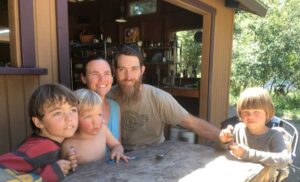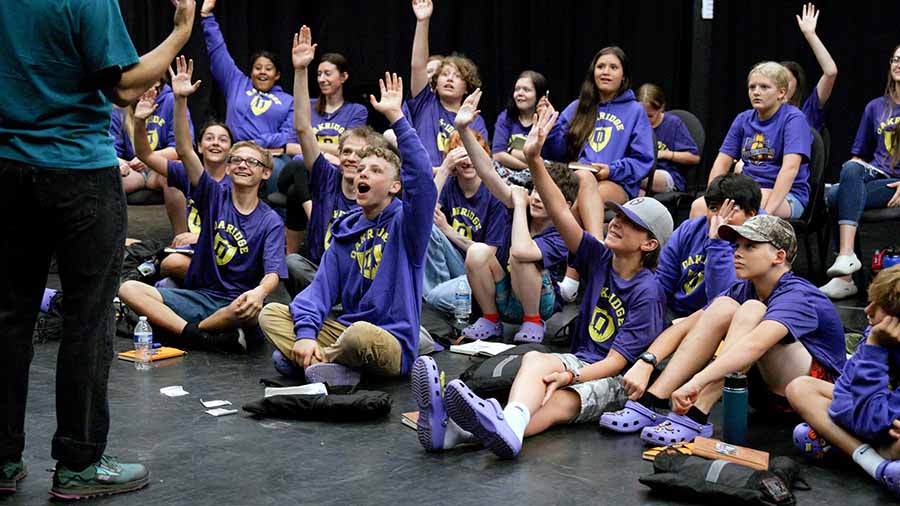At the OHRA Center, shelter guests include furry and feathered family members
By Midge Raymond
In the second-floor hallway of the OHRA Center Shelter in Ashland, Frank Dietzel holds Bo, a plushy gray cat with a white-tipped tail. Dietzel kisses Bo on the head, and the cat snuggles under his chin.
“I don’t know where I’d be without him,” Dietzel says.
For those without secure housing, a companion animal provides comfort, hope and family amid the myriad challenges of being unhoused. Research indicates that unhoused people are more attached to their companion animals than those who are housed, and that more than 90 percent are unwilling to abandon their animal companions in exchange for housing. Other studies reveal that even when food is scarce, unhoused guardians will make sure their pets eat first.

And this is why “OHRA has always had a pet-friendly policy,” says Lisa Smith, director of operations for Ashland’s Opportunities for Housing, Resources & Assistance (OHRA). Even before OHRA moved to its building at 2350 Ashland St., during its winter shelter from November to April “people were allowed to bring their cats and dogs to stay with them.”
Now, at the OHRA Center Shelter, where guests can stay for up to six months as they work on a housing plan, “we encourage them to bring their furry little friends in with them,” says Smith. “We’ve had over 100 pets in the shelter since we opened in 2021. We’ve had dogs, we’ve had cats, we’ve had hamsters. We’ve had chickens. Currently in my office I have two big rats that somebody who got housed could not take care of anymore, so the young woman left the rats here. And she comes by to visit them.”
More common is to see shelter guests with dogs and cats — most of whom are long-time companions.
“I’ve had him for quite a while,” Dietzel says of Bo. “He’s my emotional support.”
Bo, who wears a black harness, is nestled in Dietzel’s arms and meows every few moments as Dietzel speaks.
“I love this little guy with all my heart. He’s been with me through thick and thin, and every time I get depressed he comes up and starts kissing on me and cheers me up. He’s been licking my face and stuff like that, which really cheers me up. He’s a great little guy.”
When Bo hears a sound in the hallway, he nuzzles closer, stretching a paw around Dietzel’s neck.
“I don’t know what would happen if I didn’t have him,” Dietzel says. “I get depressed real easy, and he brings me out of my depression. And there’s been times I’ve actually contemplated” — Dietzel pauses and takes a breath — “taking my own life. But with him, I don’t have to worry about it because if I do take my own life, I’m not going to be here to raise him, and I want to raise him. And he’s such a lovable cat. That’s why I can’t take myself away from him.”
With the help of OHRA’s resource navigators, Dietzel and other guests work on finding pet-friendly housing. One potential barrier is a required pet deposit, which is sometimes covered by grants. Katie Blomgren, OHRA’s resource director, oversees the navigation staff and says, “If we have the funding that allows for a pet deposit, then we’ve hit the jackpot.”

If funding isn’t available, Blomgren says, “we try to get those animals certified for the guest so that they don’t have to pay that pet deposit, so they can just have that automatic move-in.”
In some cases, landlords don’t allow pets at all, but if a pet is certified as a service animal, this helps in two ways because landlords, Blomgren says, “are supposed to forgive that portion of things — letting the animal in as well as not requiring the deposit for the pet.”
OHRA aims to keep guests and their pets together “because for so many of our guests it’s everything to be able to have their family member,” says Blomgren. “So as far as I’m concerned, it’s a requirement.”
OHRA guest Maureen Dolan knows how challenging it is to find housing, let alone pet-friendly housing.
“It’s hard to find a place, period,” she says. “Because everybody wants $2,000 or more, and I don’t have that much.”
At first it took Dolan a while to reach out to OHRA and ask for help.
“I was struggling, and the rents just kept going up and everything seemed so expensive, and at the end of the day, I wouldn’t have any money for food,” she says.
Eventually she took the advice of her AA sponsor.
“I had a dream, you know, and then I woke up and I’m like, just listen to her. Just take her advice — that’s why she’s your sponsor. So I came over here and I met (my resource navigator) and here I am.”
In their room at OHRA, Dolan’s cat, Mr. Kitty, rests on a pillow on the bed, looking both alert and relaxed at the same time. A long-haired tabby, he is about 12 years old, Doland thinks; she got him from a woman in AA when he was about two or three years old.
“He wasn’t a kitten,” Dolan says. “He had his cat habits already set up.”
Community members can support OHRA guests and their animals by donating unopened dog and cat food at the OHRA Center in Ashland, and financial donations can be earmarked for OHRA’s Pet Fund.
Dolan has moved a lot over the years, and Mr. Kitty has been her constant companion, even when she lived in a shed for two years in California’s Lucerne Valley. It was “really hot,” Dolan says, but also “really great, because I learned about simple things, like how to be calm, how to be quiet, and the stars and everything.”
She adds about Mr. Kitty: “He used to bring me mice at night.”
And when she moved to Ashland in March, Mr. Kitty came too. “He’s my buddy,” she says. “He wants to play. He always likes the blanket game when I make the bed in the morning. He tries to block me, and then he goes underneath it and hides, and it’s really cute. He makes me happy, you know? And then he purrs really loud, so I get happier.”
Now Dolan, working with her resource navigator, has a lead on a pet-friendly housing opportunity that she says is “showroom beautiful. It’s for seniors and they allow pets and who knows? I’m giving it to God.”
She picks up Mr. Kitty and holds him in her lap, rubbing his belly. About their shared adventures, she says he didn’t always love the traveling, but “he’s really good now. He totally trusts me, and that’s amazing ’cause, you know, I’m a little crazy.” She laughs. “He’s like, ‘Yeah, it seems okay to me, Mom.’ He seems very happy.”
The love and affection humans have for their animals goes both ways, yet another reason to keep them together.
“We want our guests to be successful and happy with their animals — and we’re all animal lovers,” Smith says. “We don’t ever want owning a pet to be a barrier to having a roof over your head.”
Ashland resident Midge Raymond is co-founder of Ashland Creek Press and author of the novels “Floreana” and “My Last Continent” and co-author of “Devils Island.” Email suggestions and questions for Catty Corner to her at [email protected].



















